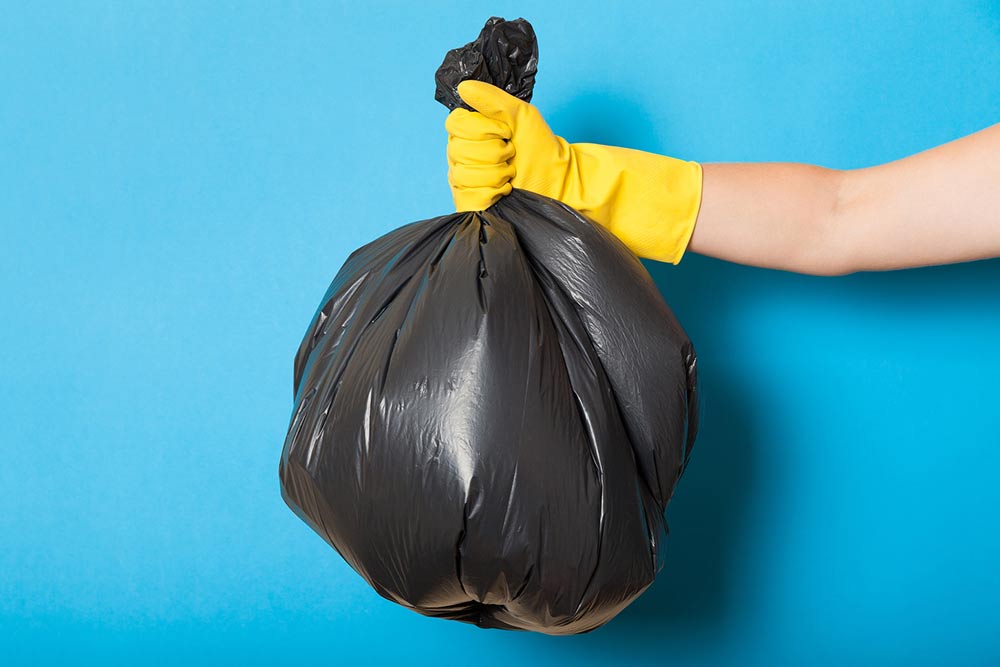14 tips for effective usage and disposing of waste bags

Waste bags are essential for the seamless execution of garbage collection and disposal. Apart from being an efficient way to keep waste contained and prevent it from spreading and causing an environmental hazard, they also help by minimizing odors and reducing human contact with unsanitary waste. Using and disposing of garbage bags responsibly is important, and here are a few tips on how one can ensure this.
How to use waste bags effectively
- Choose the right colors
The first step is to choose the right kind of waste bag for the right kind of waste. Segregation is very important, and there are different color codes for the type of waste one disposes of.Black trash bags are for non-biodegradable waste, such as plastic bottles and containers, while transparent trash bags are meant for recyclables. Biodegradable waste, such as twigs, leaves, mulch, and food scraps, on the other hand, should be contained in green trash bags. Blue trash bags are meant for disposing of industrial-sized plastic parts, glass, metal, etc. Medical waste, such as syringes, used test tubes, and cotton, should be disposed of with utmost care in red waste bags, while yellow bags should be used for hazardous materials.
- Pick the right bag size and capacity
Stuffing or overfilling can cause garbage to spill or tear, defeating the purpose of using a waste bag to contain it. Ensure the garbage bag is filled just enough not to be underutilized and wasteful and yet be completely sealed without any gaps. Garbage bags come in various sizes, from small ones meant for the kitchen to larger ones for curbside bins. Assess the need and then make a purchase. - Factor in the bag’s strength and durability
The basis of choosing a bag should depend on the type of waste that usually is disposed of. Heavier waste warrants a thicker and more durable bag. - Double bag it
Sometimes sharp objects like broken glass or metal can tear through the waste bag. If disposing of any sharp-edged scraps, make sure it’s double-bagged to prevent it from falling out and possibly injuring garbage disposal personnel. - Consider environmental impact
Consider the impact personal and sometimes mundane choices can have on the environment, particularly if those choices are a regular affair. Waste bags are used every single day, and choosing environmentally friendly ones can help minimize one’s contribution to environmental pollution. Switching to eco-friendly waste bags can be the easy “green” choice. - Fasten it
A waste bag’s closure or fastening mechanism can make or break its viability. Drawstrings, twists, ties, or adhesive flaps are the types available, and one should choose the appropriate one for hygiene purposes and to prevent spillage. A well-fastened garbage bag will also seal in any odors, preventing the smell of decomposing waste from emanating. - Choose quality over price
Choosing to buy a cheaper, smaller, or flimsier set of bags can be enticing, but in the long run, one might find oneself having to double bag more often or use multiple bags for even a day’s worth of garbage. Buying sturdy, good-quality bags according to one’s needs will offer long-term value.
Disposing of waste bags effectively
- Keep bins clean
Whether in the house, garage, or curbside, it is essential to keep bins clean. No matter how fastidious or perfect, waste bag disposal is incomplete if the bins that hold them aren’t clean or closed well. Dirty or broken bins let the odors out and are literal invitations to animals to get into the trash. Clean the bins thoroughly with water and a cleaning solution to get the grime and odor out. This needs to be done regularly, especially in case of a spill. - Separate waste
Ensure all the waste is separated according to its categories and disposed of in the relevant bags. This will help with the efficiency of the disposal process after garbage collection. - Recycle
Using the right type of bags for recyclables is one of the most important steps to dispose of waste bags effectively. All recyclable materials must be placed in the appropriate bag so that they end up at the recycling center and not in a landfill. - Use compostable trash bags
Choose compostable waste bags instead of disposing of kitchen, food scraps, and yard waste. These bags will keep the garbage secure and help by degrading it into compost without the ill effects of plastic on the environment. One can choose to use this in their home composting systems or ensure the bags reach a municipal compost facility. Either way, it’s great for the environment. - Follow local laws
Rules regarding waste and its disposal can vary, so if one is new to the area, it’s best to get acquainted with the laws to avoid a fine. - Avoid illegal dumping
Not only is dumping garbage and waste bags in areas that are not designated landfills illegal, but it’s also an environmental issue and can spread disease, germs, and bacteria. Some cities and suburbs have landfill facilities where larger items that are not accepted in curbside collection can be disposed of. - Consult local authorities
Hazardous materials, like batteries, paint, cleaning chemicals, and bulbs, should never be thrown away in garbage. Local waste management facilities must be consulted before throwing away anything hazardous to avoid a fine or a mishap.



